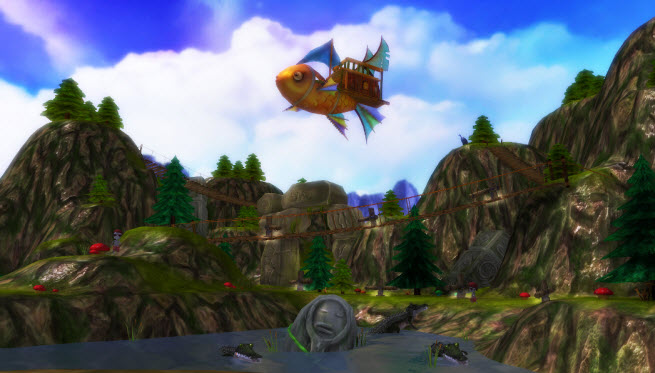Lots of tool makers claim they can enable anyone to build games, but that usually just applies to professionals who already have development experience. With today’s introduction of Jumala, Blade Games World wants to extend game creation to just about everyone.
[aditude-amp id="flyingcarpet" targeting='{"env":"staging","page_type":"article","post_id":415844,"post_type":"story","post_chan":"none","tags":null,"ai":false,"category":"none","all_categories":"business,games,","session":"C"}']Jumala isn’t just a set of development tools. It’s actually a destination world where you can make and share 3D games with your friends. It is jumping on the twin trends of gamification (the use of game-like rewards in non-game applications) and user-generated content.
“We make building a game into a game itself,” said Virl Hill, chief executive of Blade Games World, in an interview with VentureBeat. “It is a way to make it fun and accessible for everybody.”
AI Weekly
The must-read newsletter for AI and Big Data industry written by Khari Johnson, Kyle Wiggers, and Seth Colaner.
Included with VentureBeat Insider and VentureBeat VIP memberships.
With Jumala, you can create 3D games using an interface that requires no technical skills. The more you create, the more you can unlock the ability to create more complex and interesting games. You can collaborate with friends and earn in-game currency that you can spend on virtual items that you can use in your games. The Jumala Marketplace has thousands of game creation content items.
On stage at DEMO, Hill said, “Jumala makes a game out of making a game.”
With Jumala, players can mix and match art styles, game behaviors, and visual and sound effects. Players can also collaborate in game creation. While other worlds are block-oriented, Jumala’s world is more realistic and visually rich. I’ve seen a demo and it’s easy enough to create things. You can, for instance, plop down trees in the world on angled hills and when you flatten the ground, the trees will face in the correct direction, upward. You can also link objects such as a hidden switch. By clicking on a “link” button on the switch, you can order it to operate a far away gate. The gate will open when the switch is on, and it will close when the switch is off. You could hide the switch to make the game harder. It is simple things like this that make it easier for a novice to design a game.
Enemies have artificial intelligence and will attack you if they see you. As the game creator, you just plop them down in the environment. You don’t have to program them.
Once you are done creating your game,you can test it with your friends and then invite the larger Jumala public to play the game. At some point in the future, it might be possible to take your creation and put it on another platform. But for now, your game stays in the Jumala world and you can share links to it on places such as Facebook.
[aditude-amp id="medium1" targeting='{"env":"staging","page_type":"article","post_id":415844,"post_type":"story","post_chan":"none","tags":null,"ai":false,"category":"none","all_categories":"business,games,","session":"C"}']
The beta is available for Windows (7, Vista, and XP) users. Hill said the key is making game design simple. Jumala uses templates (such as a spooky marsh or alien galaxy) as the foundations for game settings. Users can fill out the games by dragging and dropping objects into the terrain. They can change the lighting, backgrounds, and behaviors of game characters. The result is a unique experience that others can play. The more your games are played, the more you earn rewards.
Bellevue, Washington-based Blade Games World was founded some time ago when startup game tool developer Digini acquired Chinese game content outsourcing company Vyk.
It shifted into this different direction in 2009 when the new leadership realized that the technology could be used to “democratize” game development. The company has 13 employees and competes with rivals such as GameSalad and Roblox. The company is targeting game fans from ages 13 to 35. The initial games will be simple, but over time, Jumala will expand to enable the creation of racing games, shooters, and educational titles. In the future, third parties will be able to add additional content to Jumala and sell it to users.
The business model is not built on creating hit games, but in enabling millions of people to create games just for fun. Revenue will come from the sale of virtual goods. Hill said that the beta test so far has produced interesting results.
[aditude-amp id="medium2" targeting='{"env":"staging","page_type":"article","post_id":415844,"post_type":"story","post_chan":"none","tags":null,"ai":false,"category":"none","all_categories":"business,games,","session":"C"}']
Investors include California Technology Ventures, China Seed Ventures, and private parties. The company raised $4 million in March 2009 and intends to start another round of investment. The title is free-to-play and the company makes money selling virtual goods. Eventually, third parties will be able to upload their own virtual goods for sale.
“Our business model doesn’t require a hit game to be successful,” Hill said. “We make it possible for everyone to create a game.”
Blade Games World is one of 80 companies chosen by VentureBeat to launch at the DEMO Spring 2012 event taking place this week in Silicon Valley. After we make our selections, the chosen companies pay a fee to present. Our coverage of them remains objective.
[aditude-amp id="medium3" targeting='{"env":"staging","page_type":"article","post_id":415844,"post_type":"story","post_chan":"none","tags":null,"ai":false,"category":"none","all_categories":"business,games,","session":"C"}']
VentureBeat's mission is to be a digital town square for technical decision-makers to gain knowledge about transformative enterprise technology and transact. Learn More

